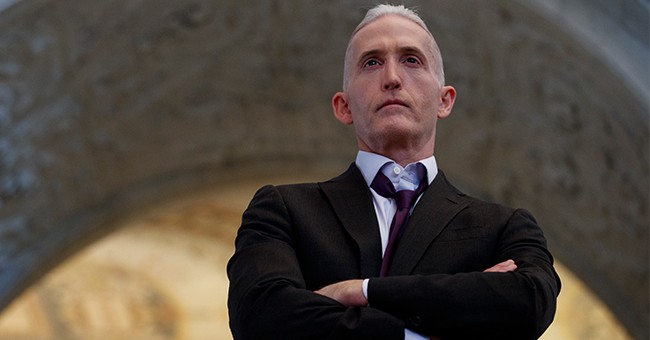[
Transcript] – MR. GIDLEY: Thank you so much everyone. We appreciate you joining the call. This is a background briefing regarding the letter to the House Representatives. Keep in mind that this call is attributable to a senior administration official, so on background only. It is also embargoed until the conclusion of the call.
With that, I’m going to turn it over to [a senior administration official] to give you a brief overview of the letter. And then I have [senior administration officials] to answer questions after the presentation.
So, with that, I’m going to turn it over to [senior administration official].
SENIOR ADMINISTRATION OFFICIAL: Thank you, Hogan. Thank you everyone for being on the call. Today, White House Counsel Pat Cipollone sent a letter to Speaker of the House Nancy Pelosi, and to the chairmen of the Foreign Affairs, Intelligence, and Oversight and Reform committees of the House of Representatives, explaining the President’s and the administration’s position with respect to recent requests for information in connection with what the House has characterized as an impeachment inquiry. And the letter explains that there are legal and constitutional flaws that make what has been labeled a so-called “impeachment inquiry” invalid as a constitutional matter.
For the first time in our nation’s history, the House of Representatives is now purporting to proceed on an impeachment inquiry against the President without conducting a vote on the House floor. This has never happened in the history of the country. There’s always been, in every prior inquiry into a presidential impeachment, a vote on the House floor.
And here, the House is purporting to proceed simply on the basis of a news conference that the Speaker of the House had. And that is simply not sufficient to establish the sort of accountability to show the will of the House to embark on this that is required out of due respect for the separation of powers and for the vote of the American people that was taken in the last election.
Even more importantly, the second legal and constitutional flaw is that the House is purporting to proceed without providing any of the due process protections that have been provided in all modern presidential impeachment inquiries in the past. The House is not providing any rules to provide the President any of the basic procedural rights that would apply in any proceeding that is designed to achieve a real search for the truth.
They have denied the President the right to cross-examine witnesses, to call witnesses, to receive transcripts as testimony, to have access to evidence, to have counsel present — all of these. And these have been in the 1970s, in the inquiries into President Nixon; in the late 1990s, the inquiries into impeachment with President Clinton. All these rights were available. It is unprecedented that they are being denied here, and it violates basic due process standards.
In addition to that, by failing to have any resolution on the House floor, the House has avoided giving even the minority on the committees the right to subpoena. So, in all prior modern presidential inquiries into presidential impeachment, the minority party has had co-equal authority to issue subpoenas to gather information along with the majority.
This is the first time ever that someone — that a House has tried to pursue such an inquiry while denying the minority that right. And it simply guarantees that this would be a one-sided inquiry, a one-sided effort by one party to gather the information that it finds favorable, without the same power on the other side to gather other information.
And that’s contrary to one of the basic tenets of our adversarial system of justice, which is that, in having an adversarial presentation of evidence — two sides trying to get at the truth — that is the best way to get at the truth of something. Again, it’s denial of basic fairness, fundamental fairness in this process.
And so, the letter explains that there are these flaws denying fundamental fairness and due process, contrary to all history and precedent in the country, and explains that the reason the Democrats are proceeding in this fashion is that this is really nothing but a political strategy.
It’s a political stratagem because the Democrats want to overturn the results of the 2016 election and they want to use impeachment as a political strategy to influence the results of the 2020 election. And this, again, is unprecedented in the history of our nation to use such a grave constitutional proceeding for such raw political ends.
It’s something that was denounced even by Chairman Nadler in the context of the Bill Clinton impeachment. He explained then that there should never be a narrowly voted impeachment, or impeachment supported by one political party and opposed by another — that that’s simply not the proper use of impeachment.
The letter goes on also to explain that there are some serious questions raised by some of the conduct of the committees — with Chairman Schiff, for example, first denying that he had any contact with the whistleblower, then having to admit that that was not true. And that these are questions that ought to be explored. But given the current procedures — the constitutionally flawed procedures that the committees have adopted, there is no opportunity either for the President or for the minority, so the Republicans in the House, to explore these issues. There’s no subpoena power for them. There’s no way for them to get access to evidence. There’s no opportunity for the President to confront witnesses at all or cross-examine them. So the entire process is flawed from the outset.
And the letter concludes by explaining that, given these constitutional flaws and the President’s obligations under the Constitution and to future occupants of the Office of the Presidency, that he cannot have his administration participate in this unconstitutional procedure, and that, under the current circumstances, at least as currently framed, that he and his administration will not participate in this process.
I think that’s a good summary of the letter, and we’d be happy to take questions.
Q Thank you. Alex Ward from Vox here. We were talking to House Democrats today who said any action along these lines could be seen as something that could lead to articles of impeachment over obstruction of justice. I’m wondering how you view those statements by Democrats.
SENIOR ADMINISTRATION OFFICIAL: Well, asserting rights under the Constitution cannot ever properly be framed as obstruction of justice. Democrats may try to spin it that way politically, they may try to make that argument politically, but that’s a political argument; it’s not a legal argument. Standing on rights and asserting rights under the Constitution, under the separation of powers and under the due process clause, is not obstruction of justice; it’s part of the constitutional system we have.
Q Hi. This is Andrew Feinberg with Breakfast Media. Thanks for doing the call. I have two questions. The first is: Aren’t you putting the due process cart before the horse here? Because the opportunity to question witnesses against the President, wouldn’t that come in a Senate trial?
And second, since Democrats took over Congress, you guys have argued that their oversight requests aren’t legitimate without a legitimate legislative purpose. You’re now arguing that the impeachment inquiry that you said — that you guys previously said that the administration would cooperate with — have the obligation to cooperate with — is illegitimate because there hasn’t been a House vote.
What’s to stop you from arguing that an impeachment inquiry, should the House take a vote, is illegitimate because not enough Republicans voted for it? I mean, isn’t the real (inaudible) you don’t see the Democratic House as having any legitimate authority over a Republican administration?
SENIOR ADMINISTRATION OFFICIAL: Well, no, that’s not accurate at all. And the answer to both of your questions, really, is grounded in precedent.
As to the first one, the ability to question witnesses in all modern presidential impeachment inquiries — even at the inquiry stage in the House — the President was afforded the ability to question witnesses. President Clinton’s counsel questioned witnesses in the House. So that’s before the Senate trial.
What is unprecedented is the denial of that ability under the current procedures that the House is pursuing right now. And in terms of oversight, you’ll see towards the end of the letter, we point out that Congress can’t have it both ways here. It can’t have — purport to be pursuing an impeachment inquiry without the requisite procedures and then try to rely on its oversight authority to be doing that.
And the precedent is that for impeachment inquiries, there is, for a presidential impeachment inquiry, a vote in the House. That’s what authorizes the inquiry to go forward. If the House wants to revert to regular order on oversight and not have an impeachment inquiry, we would be — we would respond to those requests, as we have according to the constitutionally mandated accommodation process and according to longstanding principles that have governed our approach.
Q Oh, hi there. It’s Josh Wingrove from Bloomberg. Thank you for taking the time. Can you give us sort of a practical sense of what this means? This means that all members of the administration will not testify; they will decline subpoena requests? It will not provide documents either in response to subpoenas or requests, as was the case with the Vice President? Basically, it’s just a full halt on the part of the administration. Is that correct?
SENIOR ADMINISTRATION OFFICIAL: That is correct. The administration’s policy, under the current circumstances — at least as these rules are currently framed — that the administration will have a full halt because this is not a valid procedure for going forward on an impeachment inquiry.
Q Hi. This is Yamiche Alcindor with PBS News Hour. I have a question about what happens if the House does hold a vote on the impeachment inquiry. Does the White House then say that it would provide documents and allow witnesses to testify?
And then the second question is, there’s going to be criticism that this is really the President stonewalling Congress because he doesn’t like this investigation and this impeachment inquiry. Can you say — can you answer both of those things please?
SENIOR ADMINISTRATION OFFICIAL: I don’t want to speculate about what would happen in various hypothetical situations. You know, we’ll take this step by step. We have one concrete situation now that we’re confronting; we’ve addressed it. If the House wants to engage and alter the current circumstances, then we’ll have to evaluate that as it goes along.
And in terms of your second question, this is really a situation where the President has an obligation to the institution, to the Executive Branch prerogatives and to future occupants of the Office, to protect certain principles and not to engage in a process that we believe is constitutionally defective. And it would set a precedent then for future proceedings by lowering the bar for starting an impeachment inquiry and making it much easier to use an impeachment inquiry simply as a political tool, when it should be an extraordinary remedy that is very rarely invoked, only for the gravest of circumstances.
Q Hi, it’s Steven Portnoy from CBS News. Thanks for taking this call. Gentleman, the Constitution doesn’t have too much to say about impeachment, but what it does say, you know, is rather powerful. It seems you’re going to have answer a threshold question if this is tested in court. And that question might be: How do any of the premises you’ve put in your letter — the discussion of precedent, you cite the Alcee Hastings case in a footnote — how does any of that outweigh the Constitution’s clear statement that the House shall have the sole power of impeachment? Starting from that very simple basis, what’s the legal, not political, but the legal argument that the President can have anything to say about this at all?
SENIOR ADMINISTRATION OFFICIAL: Well, as you probably know, particularly in the area of separation of powers, the Constitution doesn’t say very much explicitly. It’s a principle that’s derived from the structure of the Constitution.
And in that area in particular, courts tend to look at the practice — the precedent of the way that branches have handled inter-branch conflicts, and treat that as gloss in many circumstances on what the Constitution requires.
So here, the fact that precedent is completely on our side, and it’s not really disputed that it’s on our side, that precedent itself provides a powerful gloss on what the Constitution requires in terms of separation of powers.
And I think both for having the vote in the House to establish that is actually the action of the House — the elected representatives of the people — that they want to embark on this course of a very grave inter-branch conflict requiring a vote — for that is consistent with case law in other areas, such as the courts have required a vote from the House to authorize as to engage in litigation, because it’s that vote from the House that shows the will of the body, the institution, to engage in an inter-branch conflict.
And on the due process clause, or due process protections, these are fundamental protections that are regarded as essential for the search for the truth under our system of laws. And to say that in one of the gravest proceedings that affect the entire nation to remove the President from office, that the Constitution doesn’t imply that there is any process protection, I think would be untenable.
Q This is Ben Tracy from CBS. Could you specifically say what is the bar for cooperation? Is it simply taking this vote? Do you feel like you will get these due process issues settled? Or do they have to meet all of these requirements you’ve outlined in this letter?
SENIOR ADMINISTRATION OFFICIAL: I’m not going to try to provide particular red lines or things like that. The letter, I think, speaks for itself about flaws. We have to see what the House wants to do to try to remedy them. And as I said before, I don’t want to speculate. We’ll take it as the situations develop, and day by day as things change, be able to reevaluate.
SENIOR ADMINISTRATION OFFICIAL: Moderator, we have time for one more question. Thank you.
Q Hi, this is Noah Bierman of the LA Times. You are not willing to answer what circumstances would cause you to cooperate? A lot of people will take that as, basically, an open-ended statement that you’re not going to cooperate at all and not willing to get ahead of the President, who may change his mind on a whim. Is that an accurate characterization of what’s going on here?
And how do you respond to people who are concerned about that — that this is a constitutional prerogative of Congress that is being ignored here, basically?
SENIOR ADMINISTRATION OFFICIAL: Well, I think by saying that we don’t want to speculate about hypotheticals or draw red lines, or predict the future, we are definitely not saying that — we’re avoiding saying that there is no way we’d ever cooperate and laying down something definite.
What we have done in this letter is explain the flaws under the current circumstances and how changes could address those flaws and what that might hold for the future. I don’t want to try to predict now because we’ll have to see how it develops.
MR. GIDLEY: Thank you very much, Moderator. Just as a reminder to all the reporters on the call, this call is attributable to a senior administration official. Again, it’s a background call attributable to a senior administration official. And, of course, the embargo is now lifted. Thank you so much for your time.
.













